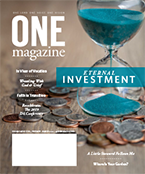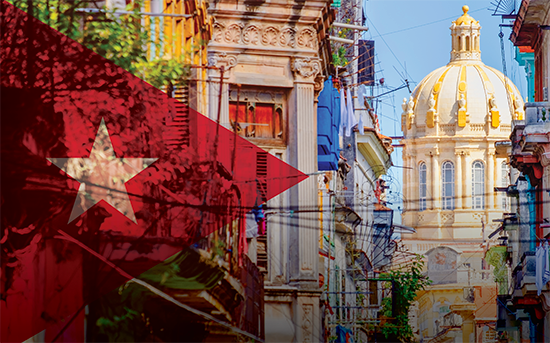
February-
March 2020
Eternal Investment
------------------
|





Cuba: Past, Present & Future
By Boris Sarlabous | Translated by Steve Lytle
It has been more than 100 years since the first missionaries from the United States entered Cuba. They established Protestant churches in a responsible and continuous way, influencing theological thought and establishing influence in other areas.
The triumph of the 1959 Revolution not only changed the course of the nation of Cuba politically speaking, but also affected the religious life of the nation. Churches founded primarily by North American missionaries, and led up until that time by those American missionaries, saw a massive withdrawal—some sooner than others—from Cuba. This left the religious reins of each denomination in the hands of the few Cuban pastors remaining. Of necessity, the extension of the Kingdom of God on the island was left in the hands of the Cuban community.
The Cuban church began to experience what, in my judgment, was a challenge to survive, extend, and think like the church. In an openly communist society, it was necessary to face two realities. Develop a genuine theology—one that defended the interests of the Kingdom of God and offered to men, whether poor or rich, the opportunity for the salvation wrought through Christ on the cross and available to everyone who believes in Him (according to John 3:16). Or, conversely, submit to a system antagonistic to the biblical way, sacrificing the interests of the Kingdom of God and putting in its place the interests of a socialist idol.
The post-revolutionary Cuban church faced major challenges. This period was characterized by a growing acceptance of the Marxist-Leninist ideology, with no space for religion other than an empty worship, conditioned toward the development of socialism.
The Free Will Baptist Church in Cuba
As with all Christian churches in Cuba, the Free Will Baptist church began through the missionary efforts of North American Christians. Thomas H. Willey dedicated a large part of his life and efforts to preaching the gospel, planting churches, and instituting the theological education of future Cuban Free Will Baptist pastors and missionaries. In 1942, the Cuban Free Will Baptist Convention was inscribed in the register of Cuban (religious) associations, and thus officially inaugurated.
In 18 years of labor, Brother Willey, along with several Cuban pastors, started some 50 churches in the western part of Cuba—from the province of Matanzas to Pinar del Río. This latter province had the largest number of Free Will Baptist churches. In 1945, the Cedars of Lebanon Theological Seminary opened its doors, and became the backbone for training pastors, missionaries, and leaders in the Cuban churches. By 1958, Free Will Baptists had 3,000 official church members.
The seminary closed temporarily in 1958 to prioritize repairs to deteriorating church buildings. However, the triumph of Cuba’s communist revolution hindered the reopening of the seminary. It remained closed for 30 years—not reopening until 1988. In 1960, circumstances in Cuba forced Mr. Willey to leave the country. His death a few years later prevented his return to the country and people he loved.
So it was, the Free Will Baptist church in Cuba was left in the hands of Cuban pastors. They suffered great difficulties, since the new government showed itself to be an enemy of the Christian faith and of the Church.
The Present
Thank God, in spite of all the difficulties, the Free Will Baptist church in Cuba has not abandoned its task and mission. In spite of the trials and restrictions imposed by the government at various times, today, the Free Will Baptist church has lengthened its cords and strengthened its stakes, and has been able to plant new churches and missions in almost every province in the country, with the exception of Villa Clara and Guantanamo.
The Cuban Free Will Baptist convention has:
-
60 churches
-
56 missions
-
63 pastors
-
20 missionaries
-
Approximately 5,000 people attend services on a weekly basis, including members and regular congregants.
The Cedars of Lebanon Seminary has a faculty of 18 full-time professors and 15 auxiliary professors. Eight groups of external students pursue associate’s, bachelor’s, and master’s level degrees. In all, 282 seminary students gain insight into God’s Word and growing His Church. In addition, the Cedars of Lebanon Seminary provides help to the FWB Bible Institute in Uruguay and the Panama FWB Seminary.
The Cuban Free Will Baptist church has sent a missionary couple to Uruguay, who work in the Free Will Baptist church in Montevideo (Malvin). Cuba also has sent a couple and a single missionary to Ivory Coast.
Cuban Free Will Baptists Into the Future
In the future, we plan to focus on planting new churches and missions, as well as continuing to send missionaries to other parts of the world. A couple is almost ready to go to Ecuador, lacking only sufficient funding.
We will continue to improve the work of the seminary by preparing professors through methodological and theological conferences, as well as promoting the recruitment of new students who sense the call to serve in any area of ministry.
We will strengthen the pastoral body in our churches. Courses in pastoral theology will be offered. We will endeavor to strengthen the work with each pastoral family, and assist in developing good personal and ministerial relationships.
Importance of the WMO
A fundamental element in the development of the Free Will Baptist Convention of Cuba has been, without doubt, the missionary offerings sent by IM, Inc. since the time of Thomas H. Willey. These offerings remain one of the primary financial supports for Cuba’s Free Will Baptist work. The main uses of these offerings are purchasing houses for new mission works, providing financial support to pastors and missionaries, printing and distributing evangelistic material, and discipleship courses.
Another important use of WMO offerings has been the operation of the seminary. Much of the Cedars of Lebanon budget comes from the WMO. These funds help train teachers, feed students, print the necessary materials for classes, and promote the seminary.
Thank you for supporting the work in Cuba by giving to the World Missions Offering.
Cuba receives partnership funds from the WMO which strengthens their ability to proclaim the gospel both in Cuba and other countries, reach young people through camps and outreach, and train leaders. Your gift to the WMO extends the Kingdom in Cuba.
About the Writer: Boris Sarlabous recently became the director of the seminary established by Pop Willey, Los Cedros de Libano Seminario in Pinar del Río, Cuba. In 2017, he expanded the ministry of the seminary by initiating extension classes on the eastern side of the island. Learn more about strategic partners for IM, Inc: www.IMInc.org
|
|

